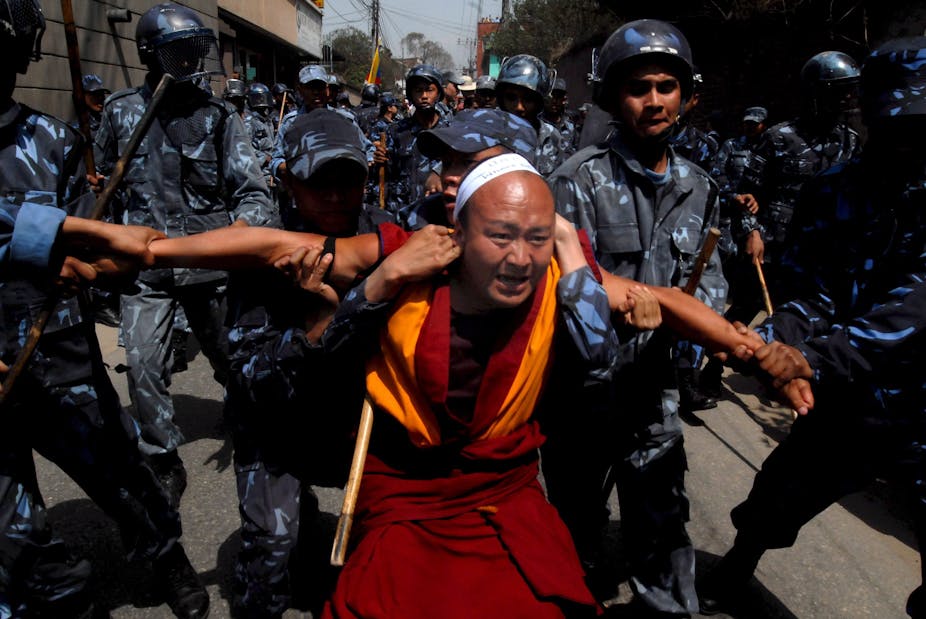In the past week, the number of Tibetan self-immolations in protest against the Chinese occupation has risen to 111 since 2009. Despite the increasing numbers of Tibetans self-immolating and general unrest in the region, the issues facing Tibetans are still on the fringes of Australian political and media discourse.
In 2011, the US Congressional-Executive Commission on China recommended continued engagement with international governments to ensure that inherent human rights are not abused. Concern was raised again in 2012 when the United Nations human rights chief called on China to address the allegations of human rights violations in Tibet.
This is supported by the Ottawa Declaration on Tibet, which:
urges leaders of all governments…to engage the government of China in the potential for serious consequences should it scrap its constitutional and legal provisions on autonomy.
Historically, Australia has condemned human rights violations across the world. But where China is concerned it is a different matter. It seems we only raise human rights concerns in the context of engaging China in an economic context with the volume on condemnation turned well down.
On January 27, 2011, prime minister Julia Gillard and then attorney-general Robert McClelland released a joint statement about strengthening the role of the Australian Human Rights Commission. In the statement, Senator Kate Lundy was quoted as saying:
we will continue to engage with the international community to promote and protect human rights at home, in our region and in the rest of the world.
Despite this sentiment, in the same year the prime minister refused to meet with the Dalai Lama to discuss the current political issues and human rights abuse facing the Tibetan people. Her reasons reasons for this were ambiguous and ill-defined.
Internationally, prime minister Gillard has openly condemned human rights abuse in Syria, yet in a speech following the meeting with China’s then Premier Wen Jiabao she could merely “hope” that human rights in China were improving, stating: “Australia hoped China was not taking a "backward step” on human rights.“

The most recent Human Rights Watch World Report suggests the human rights situation in China has not improved. The report says fundamental rights, such as freedom of expression and religion, are severely restricted and women are increasingly subjected to forced abortions and sterilisations through family planning policies. Both Tibetan and Chinese advocates for human rights and political and social freedoms are often detained, face police harassment, house arrest, short term detention, forced to undergo reeducation through labour, imprisonment on criminal charges and beatings and torture while in detention.
Research also claims Chinese border guards are detaining Tibetan refugees on the border and repatriating them back to the Tibetan Autonomous Region. In September 2006, Chinese border guards opened fire on a group of Tibetan refugees attempting to cross the infamous Nangpa pass, killing 17 year-old nun Kelsang Namsto and wounding two others.
In 2011, two Tibetan women reported that Nepalese border police on the China-Nepal border beat them with guns and then sexually assaulted them. On the China-Nepal border there is increasing speculation that if captured attempting to escape Tibet, refugees face beatings, torture and sexual abuse in the hands of both Chinese and Nepalese border guards.
China’s repression does not just apply to Tibetans. In a submission to the Australia in the Asian Century Taskforce, the ACT Tibetan Community highlighted that suppression and abuse extended to all Chinese minority groups including the Uighurs and Mongolians. They argue that China should not be considered a world power until policies aimed at eliminating these cultures and identities are revoked.
On March 18, 12 young Tibetans spent the day meeting with ministers at Parliament House to urge stronger engagement with, and action on the Tibetan issue. Six of the 12 Tibetan delegates have experienced Chinese oppression during their time in Tibet. Several were imprisoned for speaking out against human rights abuse. On the same day, the ABC discussed Iraq, Myanmar, Sabah, and Pakistan, yet remained silent on the fact that over 100 Tibetans had burned calling for human rights in Tibet.

Despite clear breaches of international human rights conventions, Australia has remained hesitant in expressing support for the Tibetan people and in condemning China’s human rights abuse. Rather, Australia is determined to strengthen political and strategic engagement, boost bilateral and economic prosperity and develop ”people-to-people“ links regardless.
Following Tibetan Advocacy Day on March 18 this year, the Senate heard a motion from Greens Senator Sarah Hanson-Young to support the exiled Tibetan Prime Minister’s call for international investigation into the deteriorating human rights in Tibet. That same motion was defeated 37-10 in the Senate in 2012 but passed unquestioned this year. Despite the fact this did not reach the mainstream media, it is a start.
Australia’s new and influential position on the UN Security Council and our increased ties with China will force us to consider our own patchy record on human rights. If we are to capitalise on our growing influence we need to be more willing to raise human rights issues and more discerning about the nations with which we chose to establish economic ties.

